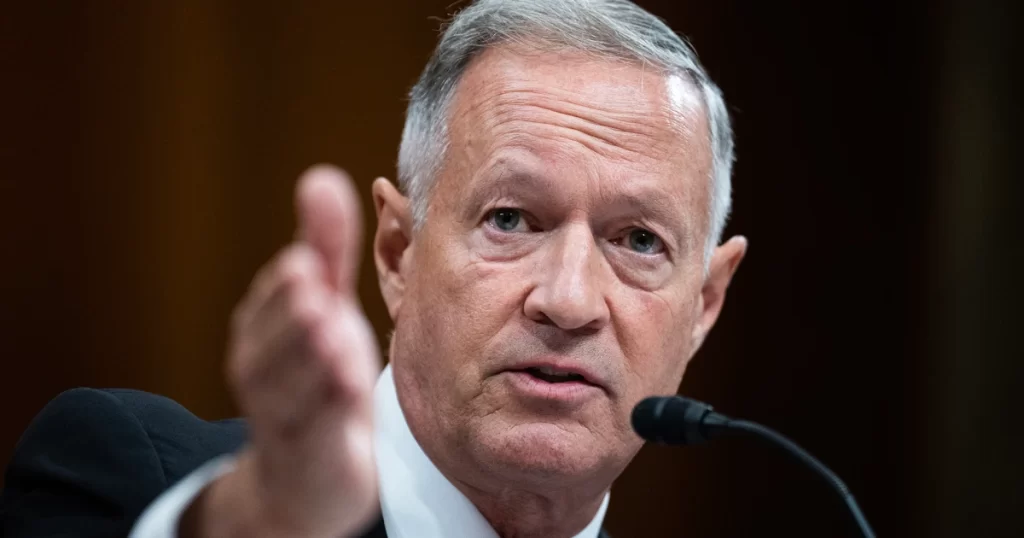DNC chair election kicks off as Martin O’Malley enters the race
4 min read
Martin O'Malley is the first candidate to officially jump into the race to be the next Democratic National Commitee chair.Tom Williams / Getty Images

Martin O'Malley is the first candidate to officially jump into the race to be the next Democratic National Commitee chair.Tom Williams / Getty Images
Martin O’Malley, the former governor of Maryland and ex-commissioner of the Social Security Administration, announced on Monday that he is entering the race to become the next chair of the Democratic National Committee (DNC). His candidacy marks the start of the election process as the Democratic Party seeks to regroup and rebuild following a tough election cycle in which Republicans reclaimed the presidency and the Senate while maintaining control of the House.
O’Malley, who previously ran for president in 2016, stressed the need for the Democratic Party to focus on economic issues in his announcement. “We must organize in every state and speak to the economic concerns of every person in America,” O’Malley said in a statement. “Jobs, opportunity, economic security for all. These are the goals of our Party and these are the things that make our country stronger.”
With Democrats now facing a period of transition and rebranding, the election for DNC chair will be a critical moment for the party’s future. The new chair will help shape the party’s direction and serve as its public face and voice, particularly in the absence of a Democratic president. The incoming chair will also oversee the debate over the 2028 Democratic presidential primary calendar, a crucial issue that has sparked controversy within the party.
The DNC’s rules committee is expected to meet next month to discuss the chair election process. The final vote to select the new chair will take place by March 1, 2025, with approximately 450 DNC members casting their votes.
O’Malley’s candidacy is just the beginning of what is expected to be a crowded field. The DNC has not held an open election for chair since 2017, when former Labor Secretary Tom Perez narrowly defeated Rep. Keith Ellison of Minnesota in a contest that reflected the divide between the party’s establishment and progressive factions.
This time, however, many DNC members have indicated that they would like to see a leader from outside the Washington, D.C. political establishment. They believe that rebuilding the party’s infrastructure and grassroots organizing capabilities should be a top priority. “We definitely need to be looking outside of the Beltway,” said Ray Buckley, chair of the New Hampshire Democratic Party. “It has to be somebody that really understands the strength of grassroots – and we need to get back to that.”
Two state Democratic Party chairs—Ben Wikler of Wisconsin and Ken Martin of Minnesota—are also being considered as potential candidates. Both have reportedly received significant encouragement from DNC members to run, although neither has made an official announcement yet. “It’s something [Wikler] is seriously considering, but no final decision has been made,” said a source familiar with his thinking.
Ken Martin has also laid out his vision for the party in a recent op-ed for Fox News, arguing that Democrats need to better connect their policy proposals, like raising the minimum wage, to their candidates. He also stressed that the party must offer a clear agenda focused on the needs of everyday Americans. “In 2025, we need to counter the excesses and extremes of the new Trump administration while also defining a clear agenda which centers on the struggles of everyday Americans hoping to get ahead, not just get by,” he wrote.
Other potential candidates include former New Orleans Mayor Mitch Landrieu, former U.S. Ambassador to Japan Rahm Emanuel, and outgoing California Sen. Laphonza Butler. O’Malley, meanwhile, has been engaging with Democratic officials across the country, speaking to over 50 people in recent days. He has already earned the support of several DNC members, including Rep. Jamie Raskin of Maryland, Sen. Chris Van Hollen, and Sen. Tim Kaine.
“The feedback we’ve received is strong and encouraging,” O’Malley said of his growing support.
As he considers a run, O’Malley has outlined plans to reform the DNC and empower state parties, drawing on his experience running the Democratic Governors Association, where he helped secure victories in traditionally Republican states like Kentucky, West Virginia, and Montana. Kentucky is the only one of these states that still has a Democratic governor.
O’Malley’s campaign message revolves around rebuilding the Democratic Party so it can effectively address the needs of Americans across the country. “There is a better day ahead,” he said. “But we must rebuild our Party so we can all get there together.”
In addition to his candidacy, the next DNC chair will face other significant challenges, including reshaping the Democratic primary calendar for the 2028 election. Last year, President Biden’s push to move South Carolina to the front of the primary calendar, followed by Nevada and New Hampshire, sparked tensions, particularly with New Hampshire’s longstanding position as the first-in-the-nation primary.
As there will be no incumbent president to influence the calendar in 2028, the battle for early primary positions will intensify. “All roads to the White House lead through this state, and we know how to win here,” said Nevada Democratic Party chair Daniele Monroe-Moreno, reflecting the competitive dynamics that lie ahead.
As the field for DNC chair continues to take shape, Democrats will face important decisions that will help define the party’s future heading into the next presidential election cycle.